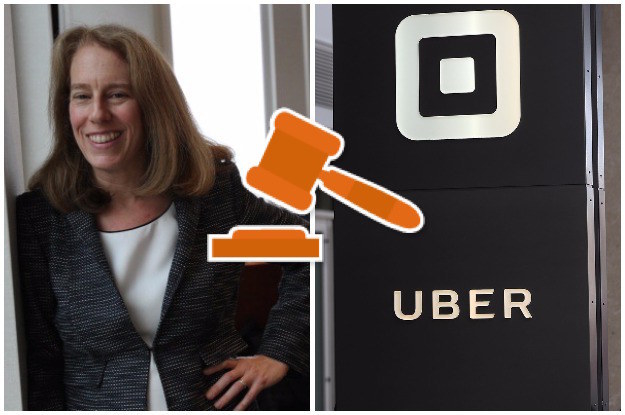
Four years after attorney Shannon Liss-Riordan first took legal action against Uber for allegedly misclassifying its driver workforce as independent contractors, the company is still fighting her class-action lawsuit. And now Uber is taking action against Liss-Riordan directly.
Uber is currently attempting a tectonic culture shift after a series of scandals. In February, a former employee’s viral blog post about discrimination and harassment launched two separate internal investigations into workplace culture; ultimately, Uber’s CEO Travis Kalanick stepped down and at least 20 employees were terminated. Executives have publicly apologized, and promised change, both for the Uber’s employees and the drivers who keep the app running.
But on Friday, Uber took a more typically pugilistic approach when it filed a motion to sanction Liss-Riordan, accusing her of willful misconduct and saying she contacted drivers using confidential information found in court documents to solicit their business.
But Liss-Riordan says these drivers were already her clients, and told BuzzFeed News there’s “nothing improper” about communication between them and her firm. “We would not be representing them responsibly if we did not keep them informed about the defendant's attempt to strip them of their right to participate as class members,” she told BuzzFeed News.
Liss-Riordan, otherwise known as Sledgehammer Shannon, became famous in Silicon Valley four years ago when she started filing class-action lawsuits accusing gig-economy companies including Uber, Lyft, Handy, Postmates, and DoorDash of misclassifying their employees as independent contractors in order to cut down on labor costs.
In March, Lyft agreed to settle its class action for $27.5 million. But the lawsuit against Uber has stalled. In April 2016, Liss-Riordan negotiated what would have been a significant $100 million settlement with Uber — but it was thrown out that August by a judge who felt she could have pushed for a larger payout. Since then, the class has splintered, with some named plaintiffs seeking new representation, and Liss-Riordan being forced to defend herself against allegations from class members and other law firms who say she’s more interested in personal profit than helping drivers.
Liss-Riordan is still fighting to keep the class-action suit together and to prevent Uber from sending drivers into individual arbitration. But she’s also preparing for the possibility that she won’t succeed. So in March she sent an email survey to drivers asking them to provide their personal information if they wanted her to represent them in private arbitration.
“In the event that Uber succeeds in breaking up the class, we want to ensure that all class members have the opportunity to continue pressing their claims individually if necessary,” she told BuzzFeed News.
But Uber says the means by which Liss-Riordan contacted these drivers violated rules around confidentiality. In the motion, Uber says she “willfully misused the name and contact information contained within the Class List — Uber’s very own “Highly Confidential — Attorneys’ Eyes Only Information” — to solicit some, if not all, drivers on the Class List for the purpose of initiating new, individual-plaintiff actions against Uber.”
Uber says, by sending the survey, Liss-Riordan confused drivers, leading them to believe that they have to sign up with her firm in order to continue to participate in the class-action lawsuit, which is not the case. In the filing, Uber points to a number of posts on popular driver message board UberPeople.net as proof that the email from Liss-Riordan’s firm led to confusion among the drivers.
Uber is asking the court to disallow Liss-Riordan from representing individually any driver who received the email in question. The company declined a request for comment on this story.
“Uber is (as I predicted) trying to stop at all costs the drivers pursuing their claims,” Liss-Riordan wrote in an email. The company’s decision to ask for sanctions against her is, she continued, “just their first step to block drivers from pursuing their rights.”
Uber has been taking steps to improve the driver experience in recent months. They can collect tips now, and in 25 states they can opt in to injury insurance, which gives them some of the protections employees are typically guaranteed. But drivers are still independent operators, working for themselves, and earning very little money in the process.
Meanwhile, most of the lawsuits Liss-Riordan has brought against gig-economy companies have fizzled out; she settled with DoorDash for $5 million, and a suit against Postmates looks to be headed the same way.
But in September, four years after she initially sued Uber over misclassification, she might finally get her day in court, albeit against a slightly less infamous startup. She’ll be representing a former contractor who worked for Grubhub, a website that facilitates delivery of restaurant takeout, at trial in Northern California. The outcome of that case could finally provide insight on the question of who on-demand workers are really working for.
Author: Caroline O'Donovan
Published at: Tue, 25 Jul 2017 17:39:31 -0400

No comments:
Post a Comment